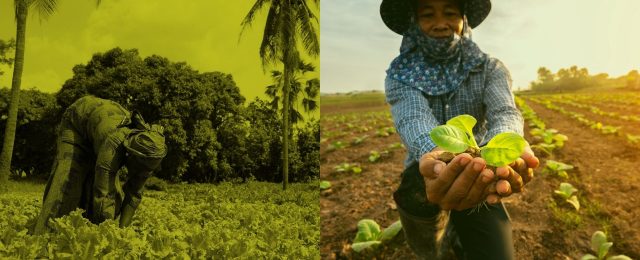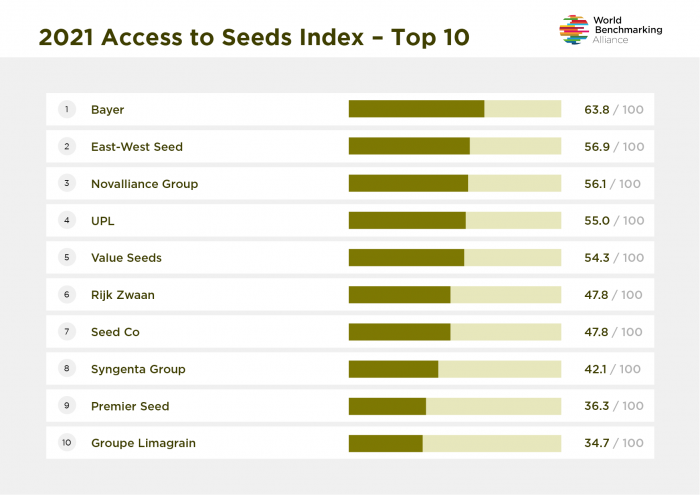See all results of the Access to Seeds Index 2021
Access to Seeds Index shows companies moving to ‘greener pastures’

The World Benchmarking Alliance (WBA) has today launched the third iteration of the Access to Seeds Index. Originally launched in 2016, the index measures and compares the efforts of the world’s leading seed companies to enhance the productivity of smallholder farmers.
This year’s Access to Seeds Index includes a total of 72 companies – 67 seed companies and 5 cooperatives – across South and South-east Asia, Eastern and Southern Africa, and Western and Central Africa. These companies are directly responsible for providing smallholder farmers access to quality seeds in lower income countries.
Local action for global impact
When comparing 2021 research findings with the first iteration (2016), both global and regional seed companies are doing much better with availability and suitable crops for smallholder farmers, showing significant progress in providing climate-resilient crops and more diverse seed portfolios.
This progress is vital for addressing the problem of world hunger. One billion people go hungry every day. This number is only expected to increase to two billion in the coming decades, due to a growing global population and climate change. The COVID-19 pandemic has only accelerated this escalation. Better access to seeds that will yield resilient and nutritious crops will also help to improve the livelihoods of smallholder farmers and their dependents, reducing inequality.
Overall, many companies of the Access to Seeds Index are still lagging behind in performance and need to work on crop affordability, farmers’ autonomy and encouraging local participation. For example, some companies could do more to ensure that their payment plans meet the needs of financial constraints of farmers, so that they are able to buy new seeds at the right time for each planting each season.
Companies must invest more efforts in developing and providing the nutritional value of crops, incorporate smallholder farmers’ local knowledge in breeding programmers, and ensure a fair price for quality seeds. Access to diverse and quality seeds is essential to produce more and better food while increasing income and improving livelihoods.
A good crop starts with a good seed
The COVID-19 pandemic has directly impacted seed companies and farmers, bringing both opportunities and challenges for the industry. In the past year, there has been an increased use of technology to communicate with farmers during the pandemic when they weren’t able to visit them in person. That extra support has been perceived as a ‘positive’ consequence from worldwide restrictions during the pandemic, and it helped to reach even more smallholder farmers in remote locations, including female farmers, who play a key role in ensuring food security for the next generation.
The effort of the seeds industry is crucial with its position at the beginning of the food value chain to ensure enough food for farmers and collectively contributing to food security. Although the challenges are many, in collaboration with research, investors, policymakers, and consumers, the seed sector can build a thriving environment that allows smallholder farmers to feed more people today and tomorrow, while conserving our biodiversity and natural resources.
Bayer tops the ranking in Western and Central Africa

The 2021 Western and Central Africa regional ranking has been published today, and is one of the three Access to Seeds Index regional rankings that will be launched this year. The Western and Central Africa ranking measures the efforts of 32 leading companies with presence in 22 countries of the region.
The high-performing companies show great ambitions and clear access to seeds strategies to reach more smallholder farmers and good performance across the index measurement areas. In contrast, companies not disclosing information on their activities and efforts rank low.
German company Bayer leads the ranking scoring 63.8 out of 100 possible points. It is also the first time Bayer is included in the ranking, and its high score reflects an ambitious strategy and all-around program to reach smallholders in the region.
Thailand’s East-West Seed ranks second, one place higher than 2019. It is widely present in Western and Central Africa, and performs strongly in all measurement areas, but has not yet invested in seed production in the region.
The Novalliance Group, headquartered in France, ranks third, consolidating its expansive presence in Western and Central Africa, covering 20 countries and offering training to farmers in 13 of them.
The top 10 of the 2021 regional ranking shows progress in more companies’ activities and performance compared to 2019. Overall, for a long tail of companies this is not the case, as they have not communicated transparently or disclosed details.
The Access to Seeds Index is a spotlight ranking part of the new Food and Agriculture Benchmark, launched today. The Food and Agriculture Benchmark is a broader assessment of 350 food and agriculture companies, spanning the entirety of the food value chain. All companies assessed are part of WBA’s SDG2000, a list measuring the 2000 most influential companies in the world towards achieving the Sustainable Development Goals (SDGs).
Also in French: Méthodologie de l’Indice de l’accès aux semences 2021